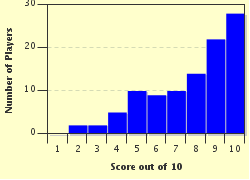Quiz Answer Key and Fun Facts
1. As you might know, metals come in several different groups. In which of these groups does magnesium belong?
2. Did you know that there are more than 20 isotopes of magnesium? Unfortunately, most of them have very short half-lives (they decay into other elements). How many stable isotopes does magnesium have?
3. Are isotopes too science-y for you? Let's switch to people. What is the name of the Cornish fellow who was the first to isolate magnesium (and abominated gravy)?
4. It is difficult to pinpoint the exact colour of an element, but which of the following is closest to the colour of magnesium?
5. Now, let's talk compounds. OH, let's see... you might have heard of milk of magnesia, which is used mostly as a laxative. But which magnesium compound actually is it?
6. Magnesium is one of the most abundant elements in the world. In which Asian country is the majority of magnesium produced?
7. All of this talk of magnesium must be tiring. Let's get something to eat. Which is the following foods is NOT a good source of magnesium?
8. You've heard about its isotopes, where it's produced, even in which foods you can find it. The leader of the Argonauts will know for sure, but can you tell me where magnesium gets its name from?
9. When magnesium burns, it is no laughing matter. What is the best method to extinguish a magnesium fire?
10. Let's close with some cool trivia about magnesium. Three of the following statements about magnesium and/or its compounds are true, and one is not. Which of these statements is not true?
Source: Author
Gil_Galad
This quiz was reviewed by FunTrivia editor
rossian before going online.
Any errors found in FunTrivia content are routinely corrected through our feedback system.

